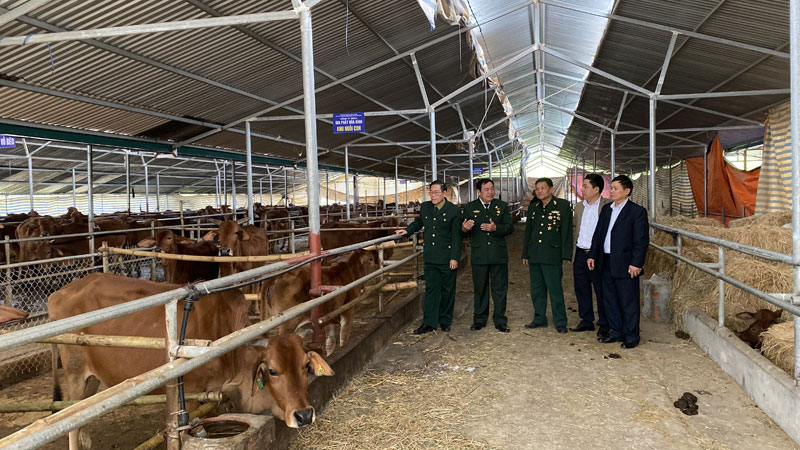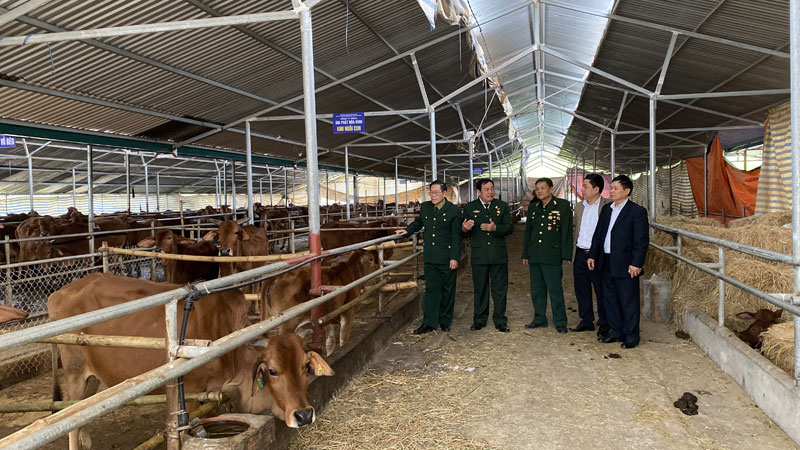
(HBO) – Promoting the pioneering role in the local economic development movement, members of the war veterans’ association in Hoa Binh city have actively learned and created effective economic models to bring high incomes for locals.
In 2019, the average income of each
member reached 57 million VND, while the poverty rate declined to 0.32 percent.
 Officials of the city’s war veterans’ association
share experience to develop cow breeding while visiting Dan Chu agriculture
cooperative.
Officials of the city’s war veterans’ association
share experience to develop cow breeding while visiting Dan Chu agriculture
cooperative.
After the mergence with Ky Son
district, the association has a total membership of 7,738. Over the past years,
it has encouraged members from the grassroots level to develop effective
economic models. Local war veterans have made use of the geographical location
of Hoa Binh city as an economic centre of the province with convenient trade
and goods transport to boost sales of local products and expand diverse
economic sectors.
The whole city counts 252 economic
models focusing on the development of agriculture, forestry and trade services,
contributing to the creation of jobs for the local labour force. More than 1,600
members have an average income of about 4.5 million VND per person per month.
Annually, the association
cooperates with departments and trade unions to open 3-4 refresher and
technology transfer courses to attract new members, as well as organise tours
to learn experience from effective and creative economic models.
In 2019, it cooperated with the
Social Policy Bank to help 1,097 households access loans worth 23.86 billion
VND.
It also made effective use of the
145 million VND capital sourced from the Central Committee of the Vietnam War
Veterans Association to create jobs for poor members./.
According to data from the Hoa Binh Provincial Party Committee, the industrial production index for the first six months of 2025 is estimated to have increased by 20% compared to the same period last year. This marks the highest year-on-year growth rate for this period since 2020.
In the first six months of 2025, Hoa Binh province’s export turnover was estimated at 1.145 billion USD, marking an 18.11% increase compared to the same period in 2024. Import turnover was estimated at $ 804 million, a 17.15% increase, which helped the province maintain a positive trade balance.
The lives of the ethnic minority farmers in Tan Lac district have gradually improved thanks to the new directions in agricultural production. This is a testament to the collective strength fostered through the professional associations and groups implemented by various levels of the district’s Farmers’ Union.
With the motto the "product quality comes first,” after nearly one year of establishment and operation, Muong village’s Clean Food Agricultural and Commercial Cooperative, located in Cau Hamlet, Hung Son Commune (Kim Boi district), has launched reputable, high-quality agricultural products to the market that are well-received by consumers. The products such as Muong village’s pork sausage, salt-cured chicken, and salt-cured pork hocks have gradually carved out a place in the market and they are on the path to obtaining the OCOP certification.
In the past, the phrase "bumper harvest, rock-bottom prices" was a familiar refrain for Vietnamese farmers engaged in fragmented, small-scale agriculture. But today, a new spirit is emerging across rural areas of Hoa Binh province - one of collaboration, organisation, and collective economic models that provide a stable foundation for production.
Maintaining growing area codes and packing facility codes in accordance with regulations is a mandatory requirement for agricultural products to be eligible for export. Recently, the Department of Agriculture and Environment of Hoa Binh province has intensified technical supervision of designated farming areas and packing facilities to safeguard the "green passport" that enables its products to access international markets.



 Officials of the city’s war veterans’ association
share experience to develop cow breeding while visiting Dan Chu agriculture
cooperative.
Officials of the city’s war veterans’ association
share experience to develop cow breeding while visiting Dan Chu agriculture
cooperative.